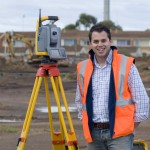Ryan Fifield, Survey Manager 
Ryan recently became the recipient of the (New South Wales) Young Professional of the Year at the Excellence in Surveying & Spatial Information Awards.
Qualifications (completed and/or studied):
Bachelor of Engineering (Surveying and Spatial Information Systems), Hons 1, UNSW
Registration as a Land Surveyor in NSW
What inspired you to become a surveyor?
I undertook work experience with a surveying firm in 2002. At that time I particularly enjoyed the active and diverse nature of the work.
From that point I was quite keen to pursue a career in surveying or engineering. When it came time to decide on university preferences I went with Surveying at UNSW, which is a decision that I’m glad I made.
What would you say to encourage a young person to consider a career in surveying?
I think the surveying and spatial information industry provides opportunities that would appeal to a range of different people. It would definitely appeal to someone active who enjoys the outdoors and would also appeal to someone who has in interest in modern technology.
There are opportunities to work in a huge range of locations and on a great variety of projects.
The forecast shortage of surveyors in Australia will only increase the exciting job prospects for someone considering pursuing a career in surveying over the next decade.
To read the rest of Ryan Fifield’s interview, please click here.
Damien Rivalland, Licensed Surveyor 
What does your job involve?
My role is mainly based around subdivision and land development which involves land title re-establishment, plans of subdivision and heaps of other things too.
What aspects of the job do you enjoy?
The variety of work and the change of scenery. The fact that I’m not tied down behind a desk five days a week. The element of problem solving – no two jobs are ever the same. For example, with re-establishment, some old titles contain errors.
What skills did you gain from your degree?
The fundamentals and technical skills needed to work in this career. RMIT is more hands on and practically based. Usually, a RMIT graduate will already know most of the fundamentals for field work.
I had an advantage of GPS knowledge because of my experience at RMIT, compared to most of the people in the surveying industry who didn’t have GPS knowledge. This is because when I first graduated, people in the industry didn’t have the training to use it and there were major costs involved with using it. It’s now become more affordable for companies to purchase and use.
Would you recommend a career in surveying to anyone and why?
Absolutely! It would suit anyone who likes working outdoors, has a mathematical mind, and enjoys technology. I recommend a career in surveying to anyone who wants to go down the stream of engineering but who doesn’t want to be in an office. I was almost going to study engineering but my brother’s an engineer and knowing that I can’t sit still, he suggested that I try surveying, as it would give me the challenges that engineering would, except allow me to be outside and get my hands dirty!
Daniel Kruimel, Licensed Surveyor
Why choose surveying?
If you’re interested in geography and spatial sciences (i.e. Google Earth), working with new technology, travelling and the combination of being able to work indoors and outdoors, well surveying is for you. The best part of my job is the variety of work I am exposed too. One day I could be working in a new subdivision making new homes possible for families, the next day in the office experimenting with cutting edge new technology, and the day after that out on a boat surveying the ocean floor!
What work experience have you had?
I began working at the surveying company Alexander Symonds during my first year of university, back in 2003 and have been there for over seven years now. I have just recently attained my cadastral surveying license after entering into a professional training agreement with the surveyor’s board. I also undertook a three month contract with the Salisbury Council, which involved asset-mapping using a GPS-equipped scooter and subsequent GIS analysis.
Who has inspired you?
I have been inspired by the current managing director of Alexander Symonds, Jim Curnow. Jim has been with Alexander Symonds since graduating and has been the managing director for over 20 years now. He has had a high level of involvement with many professional organizations including FIG and the Surveying and Spatial Sciences Institute (SSSI). Throughout his career, Jim has made great achievements in raising the profile of the surveying profession.
Shura Shukor, Surveyor
What is the most exciting thing about your job?
It was of great importance that my career would give me variety and keep me interested, so surveying is exactly what I’d hoped for. Surveying gives me the choice to work indoors or outdoors, or even both! This industry allows you to specialise in everything from cadastral surveying to geographic information systems, photogrammetry, drafting, remote sensing or even land development, always keeping me fascinated.
What is the surveying industry like to work in?
I’m always on the go and moving. Nothing is slow when you work in the surveying industry.
What would you say are the typical characteristics of a surveyor?
Patience and integrity. As an example, cadastral surveying is one of the few professions regulated by the government. This means that work done by a licensed surveyor is backed by law, ensuring the reliability of a survey, so a surveyor must carry out their work carefully and honestly which takes patience and integrity.

1 comment. Leave new
I thought it was cool that land surveyors are involved in land-title re-establishments. My brother works for a company that wants to build on a new piece of land. It may be beneficial for them to hire a land surveyor to inspect the property first.